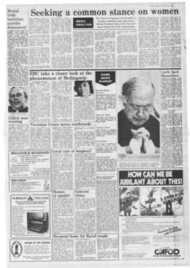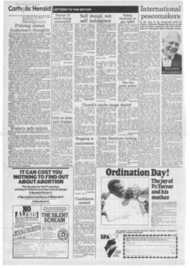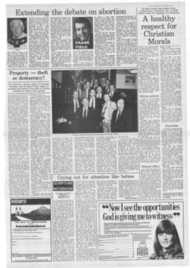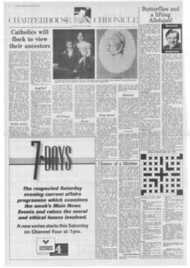Page 6, 9th February 1987
Page 6

Report an error
Noticed an error on this page?If you've noticed an error in this article please click here to report it.
Tags
Share
Related articles
To See The World Or To Solve
Ur Ar
Should 1492 Be Celebrated In Latin America Or Deplored?
Inside
U.s. Steps Up Aid To Missions
Latin America's Don Quixote
Memoirs and Memories by Gary MacEoin (TwentyThird Publications, Mystic, Connecticut: distributors, Veritas, Dublin, £8.50)
GARY MacEoin is the best informed Catholic correspondent on Latin American affairs, and in this remarkable book reveals a host of new facts on this subject, and on many matters which concern us all in the Church of 1987.
! A loyal American citizen, of Irish birth, he is, nevertheless, horrified by, for example, the CIA teaching of torture techniques to military forces in Latin American countries, and reminds us of the scandal of the CIA-backed campaign, which had the support of the Vatican and the Italian bishops, to block the Left and put the corrupt Christian Democrats in power in Italy in 1948.
Critical of the Roman Curia and its Byzantine ways, mindful of the narrow training and background of most of the cardinals, and aware of the secrecy in the world of Vatican communications, he remains, a deeply committed Catholic.
For his doctorate thesis in Spanish he chose as his subject Cervantes. All his life he has been a Don Quixote, within the Church, tilting at windmills.
His first book, and the one that made him famous, was Nothing is Quite Enough. It told the story of his being within a few days of ordination to the priesthood in an Irish Redemptorist monastery, only to be evicted, without any explanation, and without a penny, or a prospect of employment. The Irish Redemptorists took from him the best years of his young life and gave him nothing in return. If anything their, unexplained behaviour served to strengthen his Faith, and by the publication of his book he strengthened the Faith of many others.
He is today in the company of the great, Camara, Romero, Suenens, King, Boff and, above all, fellow Redemptorist Bernard Haring. In this book he reveals, for the first time, many of the inner workings of the Curia at the time of Vatican II.
Page 179 is a startling statement on the state of the celibacy of the clergy in the United States today.
For the first time he tells the background of the story of how the report of experts who challenged the basic assumptions, theological, philosophical and scientific on which the prohibition on the use of contraceptives rests, was suppressed by the Roman Curia.
On page 163 is a rcport of one of the most beautiful a, ' joyous expressions of Christ-sharing. It is a report on the theologian Bernard Haring.
This is just the sort of book, bristling with facts, by a skilled reporter, who was always there, on the spot, and at the right time, which should be put in to the hands of sixth formers and students. It will strengthen their belief in the Church.
Gary MacEoin is, of course, no pessimist, although he says "when you come to realise that the parents are hungrier than the grandparents were, and that the children are hungrier than their parents and have less opportunity to drag themselves up to a human level, you look below the surface. And what you see is that the system is not working..."
He is a great believer in the writings of the early Church Fathers. Washington behaviour in Central America, he says, shows that it has forgotten nothing and learned nothing. He is fascinated by the impact on the liberation movement, of the Mary Knoll Sisters, of Miguel D'Escoto, Ernesto Cardenal, and his Jesuit brother, Fernando, the watershed of Medellin, and the fact that Latin America will have the majority of the world's Catholics by the year 2000.
He sees hope for the future of the church in the fact that the Bishops of Peru stood by their theologian Fr Gustavo Gutierrez, and that the Bishops of Brazil stood by their theologian Leonardo Boff.
Gary MacEoin still travels the world, a frail figure with a small overnight bag on his shoulder. For him, nothing is still quite enough, and he is still a man of the deepest faith, tilting at windmills.
Terence Sheehy
blog comments powered by Disqus











